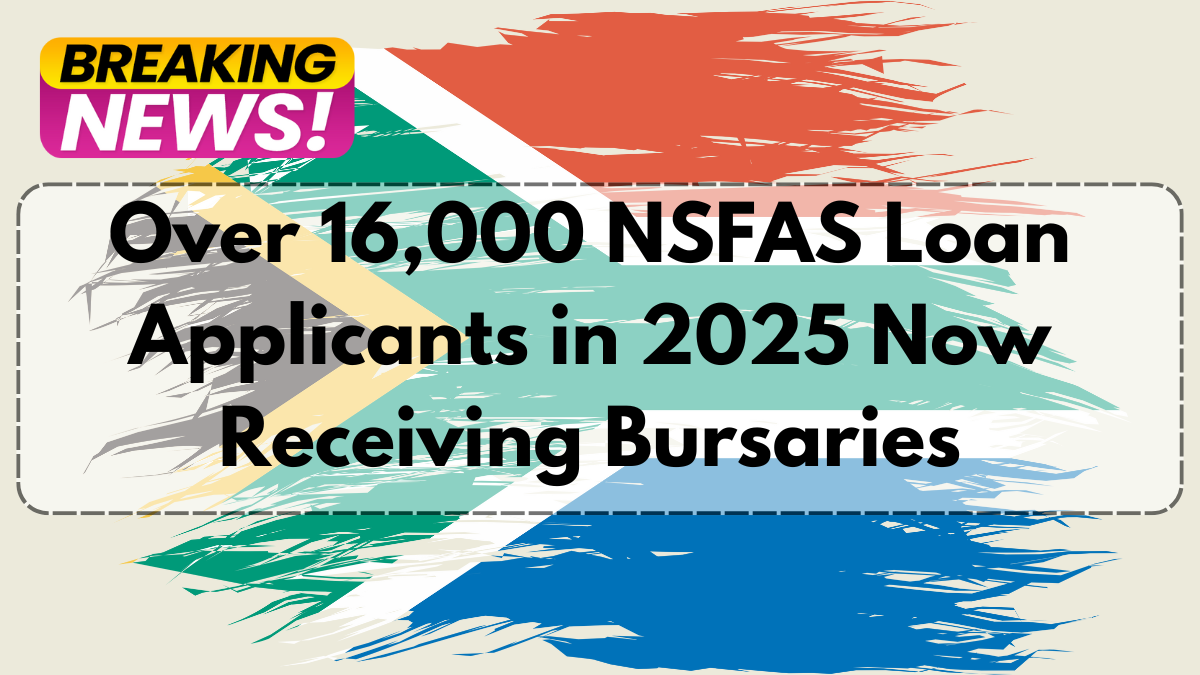In April 2025, the National Student Financial Aid Scheme (NSFAS) confirmed a major funding shift that has directly impacted thousands of South African students. After reassessing financial eligibility criteria, NSFAS announced that over 16,000 applicants who originally applied for student loans will now receive non-repayable bursaries.
This reassessment is part of a broader effort to align funding with the updated household income brackets and ensure equitable access to higher education for students from low- and middle-income households.

Why the Reclassification Happened
The move follows a detailed review of applicants’ financial data to ensure compliance with NSFAS’s 2025 funding policy. Many students who applied under the impression they only qualified for loans were reclassified as bursary-eligible after final income verifications.
This change is a significant step toward reducing the financial burden on students who cannot afford to repay loans and supports the government’s broader mission to improve access to higher education.
Updated NSFAS 2025 Application Outcomes
Below is the most recent data released by NSFAS showing the results of the 2025 application assessments:
| Application Status | Number of Applicants |
|---|---|
| Approved for Bursaries | 16,013 |
| Applications Still Under Review | 1,504 |
| Rejected Applications | 1,487 |
| Rejected Due to Income Over R600,000 | 104 |
This means that the vast majority of loan applicants—more than 16,000—will not need to repay the financial aid they receive. This provides much-needed relief for families facing financial hardship, especially as tuition and living costs continue to rise in 2025.
NSFAS 2025 Income Thresholds: Who Gets a Bursary vs Loan
NSFAS assesses financial aid eligibility based on annual household income. The funding split remains as follows for 2025:
| Funding Type | Annual Household Income |
|---|---|
| NSFAS Bursary | R350,000 or less |
| NSFAS Loan | R350,001 – R600,000 |
Students from households earning R350,000 or less automatically qualify for a full bursary, which includes tuition and additional allowances. Those in the R350,001–R600,000 bracket are eligible for a repayable loan, still offering support but with different terms.
What Does NSFAS Cover in 2025?
NSFAS continues to offer a comprehensive financial aid package in 2025, far beyond just tuition fees. Here’s what approved students can expect:
-
Full Tuition Fees: Paid directly to the university or TVET college.
-
Registration Fees: Covered without needing upfront payment.
-
Accommodation: Paid for both on-campus and approved off-campus housing.
-
Living Allowances: Monthly stipend for food, toiletries, and personal needs.
-
Learning Materials: Budget for textbooks, stationery, and electronic devices like laptops.
This all-inclusive support helps students concentrate on academic success without the burden of financial stress.
Updates for TVET College Applicants – April 2025
The final window for TVET college NSFAS applications closed in January 2025. As of early April, applicants from that cycle are still being assessed. NSFAS has indicated that results will be announced within weeks.
TVET students who meet both institutional requirements and the income thresholds are eligible for the same full range of support as university students, including tuition, accommodation, and allowances.
How to Check Your NSFAS Application Status in April 2025
If you’re still waiting for confirmation, here’s how to track your application:
-
Visit the NSFAS official website: www.nsfas.org.za
-
Click on MyNSFAS and log in with your ID and password.
-
Go to your dashboard to view the current status of your application.
-
Enable SMS or email notifications for real-time updates.
-
If your application is listed as “Pending” or “Under Review,” make sure to upload any required documents without delay to avoid processing issues.
Conclusion: A Major Win for South African Students in 2025
The NSFAS decision to reclassify over 16,000 loan applicants as bursary recipients is a milestone in educational funding for South Africa. It not only relieves future financial pressure on students and their families but also aligns with national goals of promoting inclusive and affordable access to education. As NSFAS continues to review applications, students are encouraged to stay updated and ensure their documentation is complete.
Frequently Asked Questions (FAQ)
Q1: How do I know if I’ve been moved from a loan to a bursary?
A: Log into your MyNSFAS account and check the latest funding decision. If your status shows “Approved for Bursary,” your financial aid is non-repayable.
Q2: What happens if my household income is slightly above R350,000?
A: You may still qualify for a loan, which covers the same costs as a bursary but must be repaid under terms provided by NSFAS.
Q3: Can I appeal if my application was rejected?
A: Yes. NSFAS provides an appeals process for students whose applications were denied due to missing documents or incorrect income assessments. You must submit your appeal through the NSFAS portal within the specified period.
Q4: When will TVET students get their funding decisions?
A: As of April 2025, NSFAS is in the final stages of assessing TVET college applications from the January window. Results are expected shortly.
Q5: Will NSFAS cover my rent if I live off-campus?
A: Yes, as long as your accommodation is approved by your institution and meets NSFAS guidelines.
Akesh is a furniture expert with years of experience in design and craftsmanship. Specializing in sustainable materials, he shares his expertise to help people create stylish and functional living spaces.
